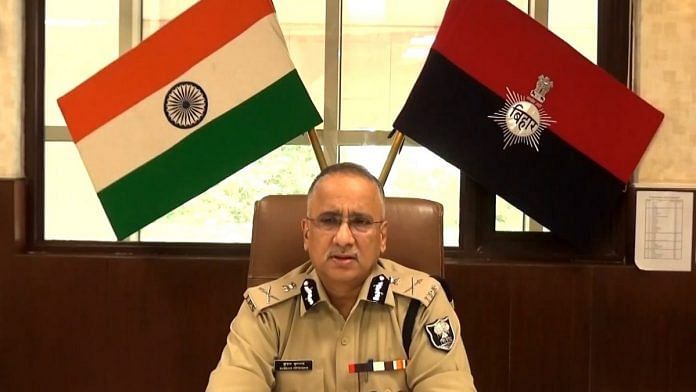Rarely do statements made by senior police officers court controversy. However, Kundan Krishnan, Additional Director General (Headquarters) of Bihar Police, recently drew criticism for attributing the rise in crime to “farmers [who] do not have any work.” “After the rains, people from the farming community get busy and incidents reduce,” he said during a press conference when asked about the reasons behind the spike in murders in the state, including that of industrialist Gopal Khemka.
The mere mention of farmers, the revered “annadata,” in the surcharged electoral milieu was bound to spark controversy. Law and order in Bihar, which goes to the polls in October-November, has deteriorated significantly, as evidenced by rising crime rates and the state police’s inability to curb violence and provide suraksha to its people.
The data shared by Krishnan indicated a trend of rising crime in Bihar, particularly homicides, after the harvesting of the rabi crops, which are sown in winter and harvested in spring. An objective analysis of such data and crime trends is always welcome. The problem was his slip of tongue, placing the farming community in the dock for the heightened murder figures.
Kundan Krishnan hails from Nalanda and is serving in his home cadre. He must be well aware of the intricacies of policing in Bihar and the sensitivities of its people and political parties, having long served in the state. His inadvertent reference to farmers has undoubtedly caused a dent in his own image as a professional, and in that of the police force in general. It is good that the officer has apologised for his statement.
Also read: Fear of criminals and cops—Bihar traders say ‘it’s jungle raj’, want Yogi-style justice
Crime data doesn’t support Bihar ADG’s claim
Growing up in the agrarian hinterlands of Punjab and Haryana in the 1970s and 1980s, I would often hear that after a bountiful harvest of wheat and other crops, there would be an uptick in the sale of jeeps and 12-bore guns, both considered status symbols in the martial North Indian states. It was also reported that these vehicles and weapons were often used to settle property disputes and personal enmities festering for generations.
The current crime data does not support such associations. Education, social transformation, urbanisation, migration, digitalisation, and commerce have majorly impacted how people respond to personal disputes and challenges. Agrarian societies are no longer isolated from these changes. Crime is a dynamic entity, constantly evolving in character. Traditional crimes like dacoity and robbery are giving way to cybercrime. Women’s empowerment has led to a significant increase in the reporting of crimes against women. Deaths on roads and the arteries of economic growth now outnumber murders by some margin.
There is a significant influx of money into agrarian and allied communities after the harvest season. This could be one of the contributing factors, but certainly not the only one, behind a rise in homicide cases in any state. Some of the accused may come from farming backgrounds. However, no community can be painted with a broad brush.
Also read: Prison reforms need to go beyond music and meditation. Try handloom
NCRB should analyse trend, share findings
Unfortunately, I am unaware of any empirical studies on the causal factors behind seasonal trends in crime in India. The State Crime Records Bureau (SCRB) of the Bihar Police should take the lead in this regard and conduct a study on the subject, which should then be presented before the state assembly for thorough discussion and deliberation. The National Crime Records Bureau (NCRB), the central repository of all crime-related data, should regularly analyse such trends and share findings with states to support more effective policing strategies. This emphasis on empirical research is crucial for informed decision-making in law enforcement.
A few years ago, the Uttar Pradesh Police faced controversy over a circular issued by the police headquarters that directed officers to mobilise night patrols based on the Indian calendar (panchang), particularly during the week before and after amavasya, or the new moon. This circular was immediately linked to Hindutva ideology and saffronisation of the police. In a country where the rural population still relies on the Indian calendar for agrarian, social, and religious practices, using such astronomical reference to enhance night patrolling should have been seen as common sense — but instead, it became an unnecessary controversy.
The data presented by the ADG (HQ) may well be irrefutable, but linking it to a particular group of people was uncalled for. Media briefings are crucial in conveying the official stance of an organisation or department. It is best to leave them to trained professionals. Just as ministries at the Centre and departments at the state level are represented by designated spokespersons — drawn either from their own cadre or from professional media backgrounds — police headquarters in states should also appoint designated media officers for daily or periodic briefings. This would help avoid off-the-cuff remarks that may unnecessarily drag the police into the cesspool of controversy. Responsible communication is key to maintaining public trust and confidence in law enforcement.
Somesh Goyal, a 1984 batch IPS officer, is a former DGP of Himachal Pradesh. Views are personal.
(Edited by Prashant)




